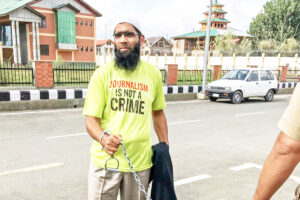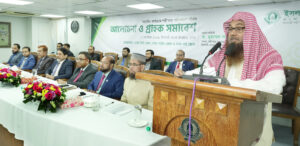 MOON Desk: Police in Indian-administered Kashmir have “strongly objected” to an article published by the BBC on press freedom in the Muslim-majority region and threatened to take legal action for “unfairly castigating” its work. The report by the British broadcaster headlined “Any story could be your last” – India’s crackdown on Kashmir press, was published on Friday and highlights the case of several Kashmiri journalists incarcerated on “terrorism” charges, under which bail is difficult to get.
MOON Desk: Police in Indian-administered Kashmir have “strongly objected” to an article published by the BBC on press freedom in the Muslim-majority region and threatened to take legal action for “unfairly castigating” its work. The report by the British broadcaster headlined “Any story could be your last” – India’s crackdown on Kashmir press, was published on Friday and highlights the case of several Kashmiri journalists incarcerated on “terrorism” charges, under which bail is difficult to get.
The report also documents the day-to-day harassment and intimidation other journalists have faced from security forces. “The article unfairly castigates efforts of J&K Police in maintaining law and order and security in J&K as biased against journalists,” the Jammu and Kashmir Police said in a post on X, formerly known as Twitter.
The police force “condemned” the attempt by the BBC to misrepresent the situation on the ground, adding it maintains “the highest standards of professionalism”.The yearlong investigation by the BBC was published just weeks after an independent Kashmiri news outlet, The Kashmir Walla, said Indian authorities had blocked access to its website.
A number of Kashmiri journalists have been arrested, questioned and investigated in relation to their work since India’s Hindu nationalist government scrapped the region’s semi-autonomous status in 2019 as part of its efforts to integrate the disputed territory into the rest of the country. Anti-India sentiment runs high in the Himalayan region, which has seen a bloody rebellion since the late 1980s. The rebels either want Kashmir to be independent or merged into neighbouring Pakistan.
India has accused Pakistan of backing the rebels, a charge Islamabad has denied.
New Delhi says its unprecedented action in 2019 was aimed at rooting out “terrorism” from the territory, which is claimed by both India and Pakistan. Each of the two arch-foes administer parts of it. They have fought two of their three wars over the region since gaining independence from the British in 1947.
Sinister campaign’
The BBC said its reporter spoke to more than two dozen Kashmir journalists for the article. They included editors and reporters working for independent and national media organisations. “The BBC has spent more than a year investigating accusations against the Indian government that it is running a sinister and systematic campaign to intimidate and silence the press in the region,” the broadcaster said.
“We had to meet journalists in secret, and they asked for their names to be hidden, fearing reprisals.” All of those interviewed said the government’s arbitrary arrests of media personalities was to send all journalists a “warning”.
One of the cases highlighted by the UK outlet was that of Aasif Sultan, who worked as an assistant editor for a Srinagar-based English magazine. Sultan has been in prison since August 2018 under the Unlawful Activities (Prevention) Act or UAPA, and is accused of “harbouring known militants”, an allegation he denies.
He has also been charged with murder, attempt to murder and other crimes.
The case of Fahad Shah – founding editor of The Kashmir Walla, who was arrested by Indian police under an “anti-terror” law last year in February – is also detailed in the report. He was accused of “glorifying terrorism” and “spreading fake news”. In their post on X, the Kashmir police defended Shah’s arrest.
“It is pertinent to mention that one of the cases mentioned, … that of Fahad Shah, is one where a trial is already ongoing … and the court has already framed charges against him under the UAPA for providing terror sympathisers a platform for advocating terrorism,” the police said.
This year, the media watchdog Committee to Protect Journalists said 62 journalists have been killed in India in connection with their work since 1992. Indian-administered Kashmir witnessed more internet shutdowns than any other country in the world last year, according to Surfshark, a virtual private network provider.
India has slipped in the press freedom index since Prime Minister Narendra Modi came to power in 2014. It ranks at 161 in a list of 180 countries.
BBC offices were raided earlier this year after the broadcaster aired a documentary that questioned Modi’s role in the 2002 Gujarat riots that killed more than 1,000 people.






